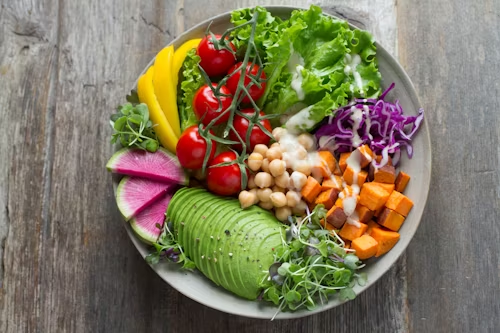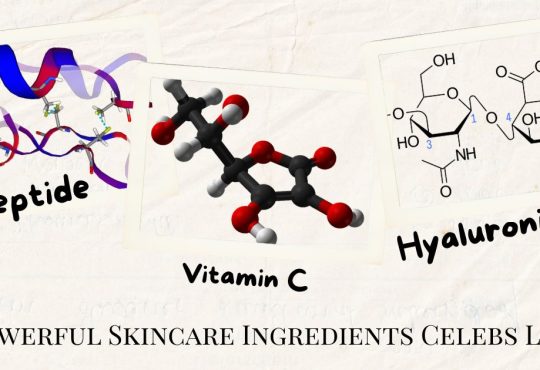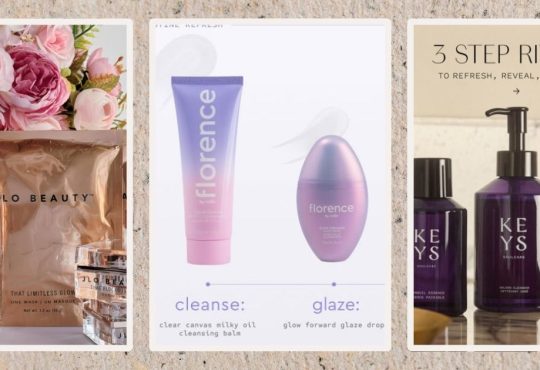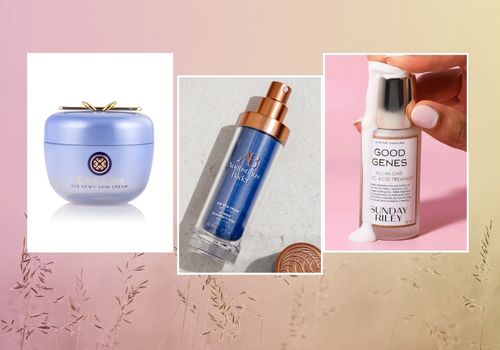
As we age, our diet influences our fitness, appearance, overall quality of life, and disease susceptibility. Our bodies naturally depend on various nutrients to support the aging process. While some nutrients can aid in slowing down visible signs of aging, particularly in promoting healthy skin, it’s essential to recognize that no single food can drastically reverse the aging clock. Nutrition is just one component of aging gracefully. Nevertheless, incorporating nutrient-rich foods into your meals can contribute to your outward appearance and inner well-being as you age.
Healthy Aging Tips: 10 Tasty Food that Help You Look Younger!
Discover these ten wholesome foods that promote optimal aging.
Extra Virgin Olive Oil
Extra virgin olive oil distinguishes itself as a powerhouse among oils, boasting a rich reservoir of health-supporting fats and antioxidants that counteract inflammation and oxidative stress induced by free radicals. Its inclusion in the diet has been associated with a reduced risk of chronic ailments like cardiovascular issues, type 2 diabetes, metabolic disorders, and specific cancer types cancers. Notably, its high content of monounsaturated fats (MUFAs), comprising around 73%, offers the potential to mitigate skin aging due to its potent anti-inflammatory properties. Additionally, its antioxidant profile, featuring tocopherols, beta-carotene, and phenolic compounds, further contributes to its anti-inflammatory prowess.
The research underscores the protective effects of a diet abundant in MUFAs from olive oil against severe skin aging, attributing it to the combined anti-inflammatory actions of MUFAs and antioxidants. Opting for cold-pressed extra virgin olive oil is advisable, as it retains higher levels of antioxidants and undergoes minimal processing compared to other extraction methods. Incorporating it into salads or using it as a dip are simple yet effective ways to reap its benefits.
Green Tea
Reen tea is a potent supplier of antioxidants, crucial for combating free radicals within the body. These unstable molecules, generated during normal cell activities or when exposed to external stressors such as UV light or tobacco smoke, pose a threat by potentially damaging cells if present in excess. Antioxidants play a pivotal role by stabilizing these free radicals, thwarting their harmful effects. Green tea, abundant in antioxidants like polyphenols, particularly epigallocatechin gallate (EGCG), catechins, and gallic acid, offers a formidable defense against various ailments, including cardiovascular disorders, cognitive decline, early onset of aging, and various other persistent health issues.
The polyphenols in green tea exhibit promise in combating external skin aging induced by environmental aggressors such as sun exposure and pollution by neutralizing free radicals before they inflict harm. This potential has led to the inclusion of green tea extract in numerous skincare products, harnessing its antioxidant and anti-aging properties. However, further research is warranted to conclusively recommend green tea products for mitigating skin aging. Nonetheless, integrating a diet rich in antioxidants, including green tea, diminishes the likelihood of chronic ailments and fosters healthier skin, making green tea consumption a beneficial addition to one’s dietary regimen.
Fatty Fish
Fatty fish emerges as a powerhouse of nutrients essential for fostering healthy skin. Rich in long-chain omega-3 fats, it combats heart disease and inflammation and maintains a robust skin barrier while alleviating skin-damaging inflammation. Among the various types of fatty fish, salmon holds a special place, boasting additional elements that support skin health. Notably, its pink hue owes to astaxanthin, a carotenoid antioxidant linked to improvements in skin elasticity and hydration, as demonstrated in studies combining astaxanthin with collagen supplementation. Although the precise mechanisms underlying these effects persist to be fully elucidated, salmon’s richness in protein further augments its skin-nourishing properties, facilitating collagen and elastin production essential for skin strength, suppleness, and resilience while aiding in wound healing.
Moreover, fatty fish ensure a generous selenium intake, a vital mineral and antioxidant pivotal for DNA synthesis and repair. Adequate selenium levels help mitigate and prevent skin damage induced by UV light and also hold promise in managing skin conditions such as psoriasis.
By including fatty fish such as salmon in your meals, you support overall health and nourish your skin from within, strengthening its defenses and resilience against diverse environmental stressors.

Dark Chocolate or Cocoa
Dark chocolate or cocoa is a treasure trove of polyphenols, serving as potent antioxidants within the body. Rich in flavanols, it offers many health advantages, including decreased chances of heart disease, type 2 diabetes, and cognitive decline. Furthermore, its abundance in flavanols and antioxidants is believed to confer protective effects against sun damage to the skin and decelerate the aging process.
Notably, a well-designed 24-week study revealed that participants consuming a flavanol-rich cocoa beverage exhibited notable enhancements in skin elasticity and reduced facial wrinkles compared to their counterparts in the control group. While these findings hold promise, certain studies have yet to consistently observe the benefits of dark chocolate on skin appearance or aging. When incorporating dark chocolate into your diet, choose options with a minimum of 70% cocoa solids and limited added sugar to maximize its flavanol content and potential health benefits.
Vegetables
Vegetables stand out for their exceptional nutrient density and low-calorie content, making them indispensable components of a healthy diet. Packed with antioxidants, they offer protective benefits against heart disease, cataracts, and certain cancers. Moreover, many vegetables boast high levels of carotenoids like beta carotene and lycopene, which research suggests may shield the skin from the harmful effects of UV rays, the primary culprits behind premature skin aging. Beta-carotene-rich options such as carrots, pumpkin, and sweet potatoes are particularly noteworthy sources of this skin-friendly nutrient.
Additionally, vegetables serve as abundant sources of vitamin C, a vital antioxidant essential for synthesizing collagen, a crucial building block of the skin’s structure. As collagen synthesis declines with age, incorporating vitamin C-rich vegetables like leafy greens, bell peppers, tomatoes, and broccoli into your diet becomes imperative. Diversifying your vegetable intake by including various colors ensures a broad spectrum of antioxidants beneficial for skin health and overall well-being. Strive to incorporate at least two types of vegetables in each meal while also prioritizing skin protection through the consistent use of sunscreen.
Flax seeds
Flax seeds emerge as a nutritional powerhouse, offering many health benefits. Rich in lignans, a polyphenol with potent antioxidant properties, they promise to lower the likelihood of long-term health conditions like heart disease and breast cancer. Moreover, flax seeds are a superb reservoir of alpha-linolenic acid (ALA), an omega-3 fatty acid variant renowned for maintaining a healthy skin membrane and promoting hydration and suppleness.
Notably, studies from 2009 and 2011 have demonstrated notable improvements in skin hydration and texture among women consuming flax seeds or flax oil for 12 weeks, underscoring the potential skin-nourishing effects of these seeds. While these findings are promising, further research is warranted to validate and expand upon these observations, emphasizing the need for continued exploration into the skin benefits of flax seeds.
Pomegranates
Like many fruits, pomegranates pack a nutritional punch with various health-promoting nutrients. Rich in fiber, potassium, and vitamin K, they contribute to a healthy heart while boasting a bounty of antioxidants, including flavonols, tannins, phenolic acids, and lignans. Growing evidence from studies involving humans and animals suggests that these antioxidants may support healthy skin aging by mitigating UV-induced skin damage and diminishing brown spots from sun exposure.
Moreover, the antioxidants present in pomegranates exhibit a dual action by safeguarding existing collagen in skin tissue and encouraging the synthesis of fresh collagen, which is crucial for maintaining skin strength and elasticity. While further research is necessary to elucidate the extent of pomegranate’s skin benefits fully, incorporating pomegranate seeds or juice into your diet offers a convenient and nutritious means of bolstering your antioxidant intake.
Avocados
Avocados emerge as a nutritional powerhouse, brimming with heart-healthy fats, fiber, and an array of vital vitamins and minerals crucial for overall health. Notably, their abundance in monounsaturated fats holds the potential to promote healthy skin by nurturing a robust skin membrane, while their significant antioxidant content aids in combating free radicals responsible for skin damage and aging.
In support of their skin-nourishing properties, a study demonstrated a positive correlation between a diet abundant in plant-based fats, like those found in avocados. It enhances skin health among older adults. With their delectable flavor and versatility, integrating avocados into your diet presents a simple and delicious means of augmenting your nutritional intake for the betterment of your skin.

Tomatoes
Tomatoes stand out for their myriad health benefits, primarily attributed to their high lycopene content. Lycopene, a carotenoid responsible for tomatoes’ vibrant red hue, is a potent antioxidant, offering protection against chronic diseases. While studies suggest that lycopene may provide modest shielding against sun-induced skin damage, its efficacy falls short compared to sunscreen usage.
Research hints at the potential skin benefits of lycopene consumption, as evidenced by a study where women consuming an antioxidant-rich beverage experienced a decrease in wrinkle depth over 15 weeks. However, attributing these skin improvements solely to lycopene remains inconclusive, given the beverage’s inclusion of various other ingredients. Enhancing lycopene absorption by pairing tomatoes with healthy fats like olive oil or avocado presents a practical strategy to maximize its benefits.
Collagen
Collagen is the body’s primary protein in skin and joints. As we age, collagen synthesis decreases, leading to apparent indications of skin aging, such as wrinkles and diminished firmness (59Trusted Source). Although this process is natural, supporting collagen synthesis through diet becomes crucial for sustaining skin health. Protein-rich foods and vitamin C are particularly beneficial.
Strategies to preserve collagen integrity involve avoiding activities that accelerate its breakdown, such as excessive sun exposure and smoking. Notably, studies indicate that hydrolyzed collagen peptides, a more readily absorbed form of collagen, may enhance skin elasticity, hydration, and firmness while diminishing wrinkles. However, it’s essential to consider other lifestyle factors like diet and smoking habits and the body’s allocation of collagen-derived proteins. Prioritizing a protein-rich diet supplemented with collagen alongside healthy sources like chicken, tofu, and fish can offer comprehensive support for maintaining skin health.
Conclusion:
Your dietary choices significantly influence your skin’s health and impact how it ages. Opting for protein-rich foods, healthy fats, and antioxidants offers notable skin benefits. Coupled with a well-rounded diet comprising whole, plant-based foods, safeguarding your skin involves adopting additional habits like consistent sunscreen use, abstaining from smoking, maintaining physical activity, and employing suitable skincare products.





